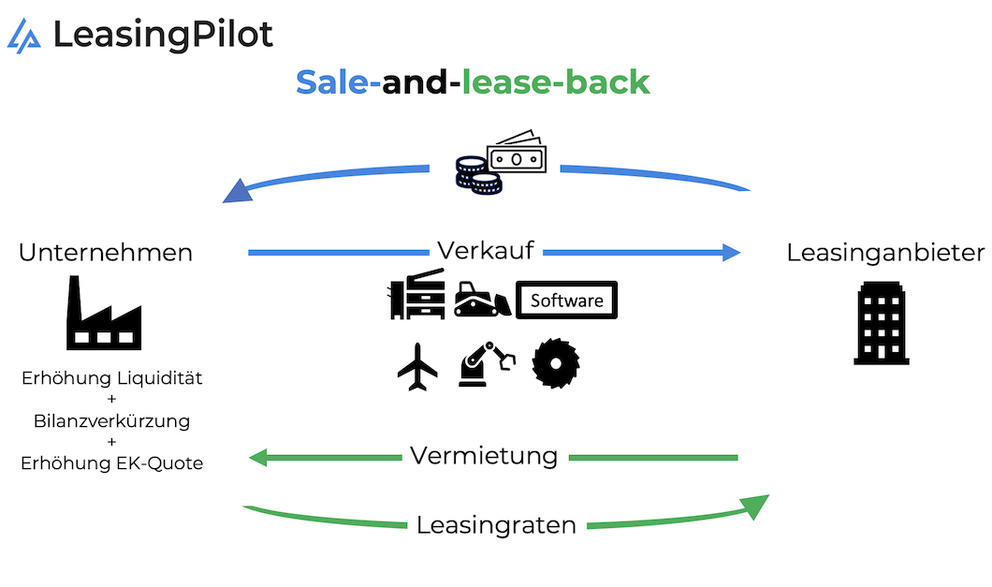Does equipment leasing offer tax advantages?
There are many advantages to leasing and hire-purchase, which we would like to present to you: Leasing often has undifferentiated "tax advantages", in particular that the "full" tax deductibility of leasing installments is advantageous.
LeasingPilot, as an independent consulting and brokerage platform, has set itself the goal of providing you with comprehensive and transparent information to enable you to make a conscious decision in favor of the financing forms of leasing or installment plan and to support you in your search and selection of the right leasing offer for your project.
Premise:
The starting point for the following explanations is a "lease decree-compliant" leasing, in which the leasing company balances and depreciates the asset, while the lessee only books the leasing rates as expenses. This is to be compared to a loan-financed purchase, where the buyer claims the financing costs and depreciation on the asset. Hire purchase is treated the same as loan-financed purchase.
The short summary is:
- In 2009, leasing lost its widely-known tax advantage compared to loans which had its cause in the trade tax treatment as it is no longer fully deductible for trade tax purposes (since then, there has even been more of a minor disadvantage in this respect).
- However, one tax advantage of leasing is that, depending on the depreciation period of the asset and the installment structure, there may be an advance effect, i.e. earlier tax recognition of the investment expenses, i.e. you can claim tax expenses in the form of the leasing installments earlier than alternatively the interest and the depreciation on the asset in total. The advantage is therefore not the "full" tax deductibility of leasing installments (this also applies to depreciation and interest), but the - depending on the structuring - earlier assertion, which leads to a present value advantage for the lessee.
- If the interest barrier applies (e.g. in the case of LBOs), leasing offers clear tax advantages, as the deductibility of leasing installments is not restricted.
Thus, there are no longer always applicable tax advantages, but tax optimization is achievable through structuring or in situations such as the interest barrier. The starting point for the explanations is "estate-compliant" leasing, in which the leasing company accounts for and depreciates the asset, while the lessee merely books the leasing installments as an expense. This is to be compared to a loan-financed purchase, where the buyer claims the financing costs and depreciation on the asset. Lease purchase is treated the same as loan-financed purchase.
LeasingPilot recommendation
If you are interested in bringing forward the tax consideration of investment expenses (especially for assets with a long depreciation period), we will be happy to advise you on the possibilities. In this case, agreeing on higher initial installments (declining balance installments) can also have interesting effects. Due to the jurisdiction of the Federal Fiscal Court, there are quite generous possibilities for movables leasing. If the interest barrier is applicable, leasing has convincing tax advantages. LeasingPilot advises you as a reasonable partner. |
To these three addressed topics in detail:
1. Trade tax addition
In principle, interest and depreciation, like leasing installments, can be fully claimed for corporate or income tax purposes; for trade tax purposes, a portion of the interest and leasing installments is added back, so that the deduction is not fully possible. This trade tax addition of interest or leasing installments only applies to the amount that exceeds the exemption amount of EUR 200,000 (for further details, please refer to the legal text of § 8 GewStG).
Then interest can only be claimed for trade tax purposes at 75%, (addition 25%), leasing installments only at 95% (addition 25% of 20%).
What seems to be in favor of leasing at first glance, however, is a disadvantage of leasing especially in low-interest phases, since the financing share is set too high in most cases due to the lump sum.
However, this disadvantage is generally not serious and should not have a decisive influence on the decision for or against leasing as a form of financing.
2. Early consideration of the tax expense
As indicated, it is possible for the lessee to claim higher tax expenses in the form of full deduction of the leasing installments earlier than if, as in the case of a loan-financed purchase or hire-purchase, the lessee were to account for the asset itself, depreciate it and additionally claim the financing interest. This depends on the individual case, as it depends on the useful life to be applied in the individual case (the official depreciation tables are only guidelines) and the applicable depreciation rules such as declining balance or special depreciation. Also, public subsidy programs such as investment grants, etc. often require economic ownership by the customer, so that only purchase or lease-purchase can be considered.
There is also the possibility of agreeing initially higher leasing rates in order to bring forward the actual and thus also the tax expenditure in time. In principle, many leasing companies offer the option of freely agreeing installment progressions. Seasonal or declining installments are not uncommon.
In the case of degressive installments, i.e. initially increased installments, the German Federal Fiscal Court has ruled that, depending on the initial loss in value of the leased asset, leasing installments that have increased significantly in the initial years are also recognized for tax purposes (BFH, ruling dated February 28, 2001, I R 51/00).
LeasingPilot recommendation
LeasingPilot will be happy to advise you on the possibility of agreeing different installment schedules.
However, please do not lose sight of the essentials, such as the total financing costs, in all tax considerations. LeasingPilot calculates the effective interest rate for each individual offer. You can also use LeasingPilot's leasing calculator to determine this yourself. |
3. Consideration under the interest barrier
The interest barrier limits the deductibility of interest expenses to 30% of the taxable EBITDA if the exemption limit of 3 million net interest expenses (interest expenses - interest income) p.a. is exceeded; the remaining amount can be carried forward as an interest carryforward and offset in later years.
However, leasing in conformity with the decree does not constitute a transfer of capital but a transfer of use and is therefore not covered by the interest barrier (see BMF letter on the interest barrier (§ 4 h EStG; § 8 a KStG) of July 4, 2008, paragraphs 15, 25).
|
LeasingPilot recommendation
In practice, almost only companies in restructuring or reorganization situations or companies with intentionally high external debt (LBO, MBO, MBI) suffer from the interest barrier.
In these situations, the addition of lease financing can be highly attractive. We will be happy to advise you on the possibilities.
|
Author: Attorney, tax advisor Stefan Sovinz (Head of Structuring at Leasing-Pilot.com)



